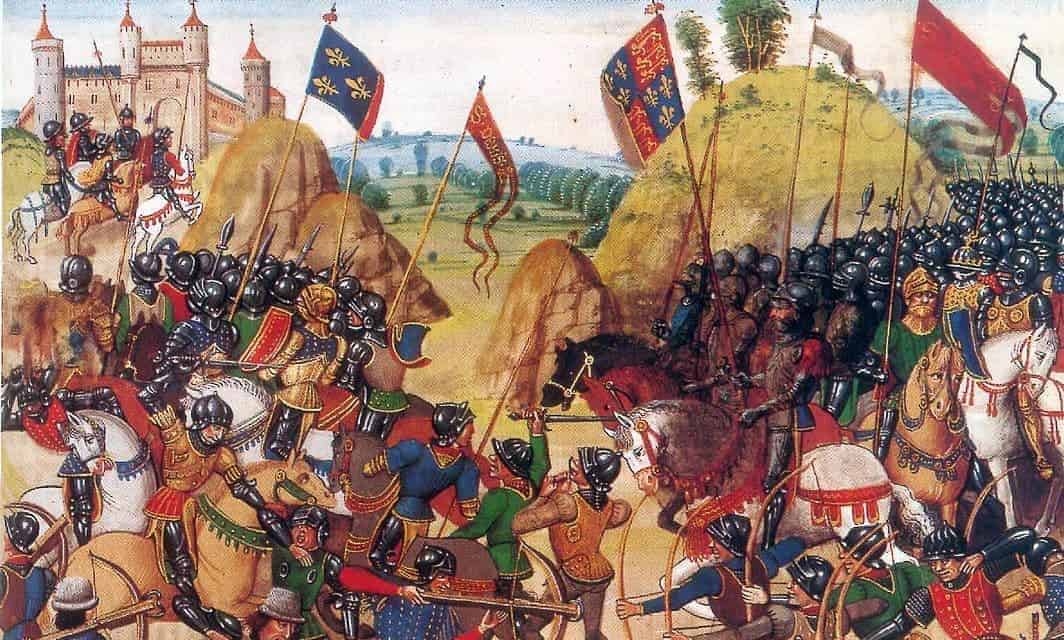On this day in history, the battle of Crecy was fought between the armies of France and England. On July the 12th, 1346, Edward the Third of England landed with an invasion force of about 15,000 men on the coast of Normandy. From here, the English army marched northward, plundering the French countryside. Learning of the English army’s arrival, King Philip of France gathered an army of 12,000 men together, made up of approximately 8,000 mounted knights and some 4,000 hired Genoese crossbowmen. At Crecy, Edward halted his army and prepared for the French to attack. On the afternoon of August 26, Philip’s army attacked, even though he was outnumbered, it was to prove a disastrous miscalculation.

The Genoese crossbowmen, who were mercenaries, led the assault, on the English line, but they were soon overwhelmed by Edward’s 10,000 archers. They could reload faster and fire much further than the Genoese. The crossbowmen had to retreat. After this, the French mounted knights attempted to break the English infantry lines. In repeated charges, the horses, and their riders were cut down in the merciless shower of arrows. Many knights were thrown from their horses and because of the weight of their armour could not move and were killed by the English infantry. The night, the French finally withdrew. Nearly one-third of their army lay dead on the field, including members of the French Royal Family and the nobility. Some 1,500 other knights and squires died in the battle. Large numbers of French knights had been made a prisoner and held for ransom by the English. Philip himself escaped with only a flesh wound. English losses are reported to have been a fraction of the French losses, possibly one hundred men.
The battle marked the decline of the mounted knight in European warfare and the rise of England as a world power. From Crecy, Edward marched on to Calais, which surrendered to him in 1347. This strategic port was to remain in English hands for two hundred years.
The battle was part of the One Hundred Years War. The One Hundred Years was a series of wars that raged from 1336 to 1453. It was fought by successive Kings of England in order to gain land or even the Crown of France. After the death of Phillip IV, there was a dispute over who should inherit the throne. The English king had a claim through his mother. The English King Edward III invaded France to secure his claim to the throne and this began the series of wars that have come to be known as the Hundred Years War. At this time, the English kings had many territories in France such as Calais and Gascony and from these locations they were to regularly launch invasions throughout the wars. For over a hundred years the English and the French fought each other.
After the death of Phillip IV, there was a dispute over who should inherit the throne. The English king had a claim through his mother. The English King Edward III invaded France to secure his claim to the throne. Edward claimed the throne through his mother Isabella, a French princess. This began A series of wars that have come to be known to history as the Hundred Years War, even though they actually lasted longer than a century. At this time, the English kings had many territories in France such as Calais and Gascony and from these locations they were to regularly launch invasions throughout the wars. For over a hundred years the English and the French fought each other.
Initially, the English seized large areas of France after the great English victories at Crecy and Poitiers. At the Battle of Poitiers, Edward’s son, The Black Prince defeated a larger army in central France. Soon half of France came under the control of the English crown . There was a French counterattack and this led to nearly all the conquered territories being reconquered. There was a long pause in the war, but no peace treaty was signed. The wars began again in 1415 when Henry V invaded France.

